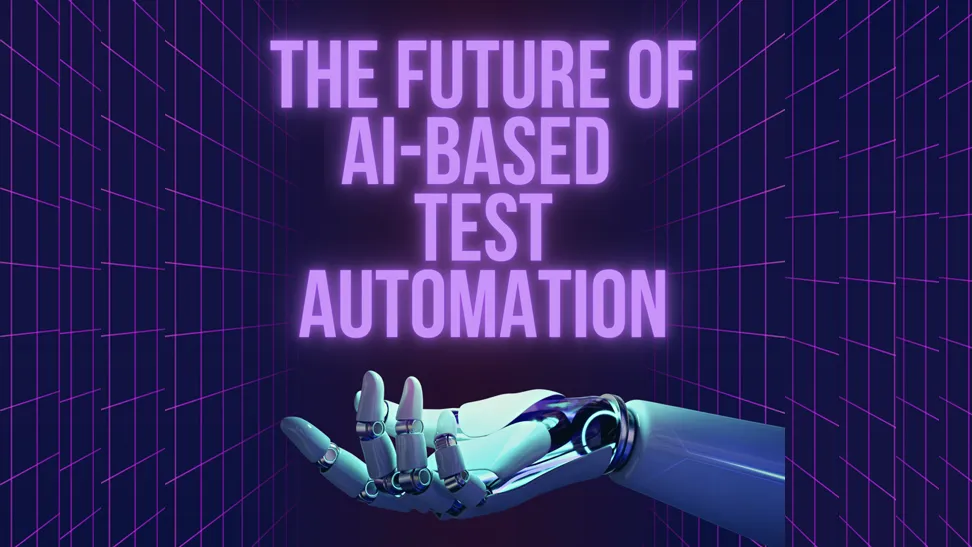Title: The Bright Future of AI-Based Test Automation: A Step-by-Step Exploration
Introduction
AI-Based Test Automation refers to the utilization of Artificial Intelligence (AI) and Machine Learning (ML) technologies in the design, execution, and management of software testing processes. It involves the creation of intelligent testing systems that can autonomously adapt, learn from testing experiences, and make data-driven decisions to optimize test coverage, accuracy, and efficiency. AI-Based Test Automation aims to revolutionize software testing by automating repetitive tasks, predicting potential issues, and continuously improving test suites, ultimately leading to higher-quality software and faster release cycles.
In the ever-evolving landscape of software development and quality assurance, AI-based test automation has become a cornerstone of efficient and reliable product delivery. With the rapid advancements in artificial intelligence (AI), the future of test automation promises to be transformative. In this article, we’ll delve into the exciting prospects and discuss the steps toward harnessing the full potential of AI-based test automation.
Step 1: Understanding the AI Revolution
Before delving into the specifics of AI-based test automation, it’s crucial to grasp the AI revolution’s fundamentals. AI encompasses a range of technologies, including machine learning (ML), natural language processing (NLP), and computer vision. These technologies empower systems to learn, reason, and make decisions, much like humans.
Step 2: Benefits of AI in Test Automation
AI brings several game-changing advantages to test automation:
- Improved Test Coverage: AI can autonomously generate and execute test cases, ensuring broader test coverage and increased defect detection.
- Efficient Test Maintenance: ML algorithms can adapt test scripts as the application evolves, reducing maintenance overhead.
- Intelligent Test Data Generation: AI can create realistic test data, enhancing the authenticity of test scenarios.
- Faster Test Execution: Parallel test execution and AI-powered optimization reduce testing time significantly.

Step 3: Leveraging AI in Test Scripting
To harness AI’s potential, we must rethink test script creation:
- AI-Driven Test Generation: AI can automatically generate test cases by analyzing requirements, specifications, and historical test data.
- Self-Healing Test Scripts: ML models can identify and correct test script failures caused by changes in the application’s UI or functionality.
Step 4: Test Data Management
Effective test data management is critical in AI-based test automation:
- Data Generation: AI can create synthetic data for testing, ensuring data privacy and security.
- Dynamic Test Data: ML algorithms can modify test data in real-time to adapt to changing scenarios.
Step 5: Test Execution and Reporting
AI optimizes test execution and reporting:
- Test Prioritization: AI identifies critical test cases, ensuring they are executed first.
- Anomaly Detection: ML models can detect abnormal system behavior during testing, flagging potential issues.
- Actionable Insights: AI-driven analytics provide actionable insights for developers and testers.
Step 6: Continuous Learning and Improvement
AI thrives on continuous learning:
- Feedback Loops: Establish feedback mechanisms to improve AI models continuously.
- Retraining: Periodically retrain ML models with new data to adapt to evolving applications.
Step 7: Ethical Considerations
AI-based test automation raises ethical questions regarding data privacy, bias, and fairness. It’s essential to incorporate ethical principles into AI testing practices.
Step 8: AI Testing Tools for Test Automation and Frameworks
Several AI testing tools for test automation and frameworks are appearing. Explore and adopt those that align with your project’s needs. Some of the most popular ones:
Step 9: Training and Skill Development
Invest in training and upskilling your QA and testing teams in AI technologies. Comprehending AI’s abilities and restrictions is crucial.
Conclusion
The future of AI-based test automation is promising, revolutionizing how software quality is assured. By understanding AI, leveraging its benefits, reimagining test processes, and addressing ethical concerns, organizations can stay at the forefront of this transformation. As we step into this new era, it’s crucial to embrace change, adapt, and continuously innovate to ensure the highest software quality standards are met. AI-based test automation is not just the future; it’s the present, and it’s here to stay.
< Home

